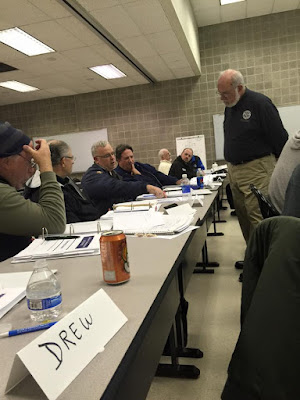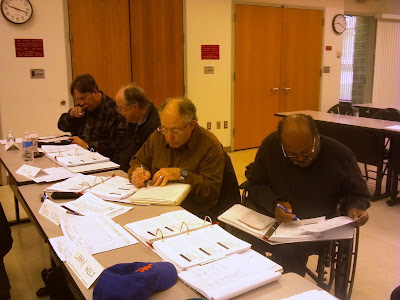 AUXCOMM
AUXCOMM
I have taken the day off from work, I have just completed, along with several of my South Plainfield RACES/ARES compadres, a two day AUXCOMM class as taught by the Department of Homeland Security OEC/ICTAP, and offered by the NJ State Races Coordinator John Miller, and the Middlesex County NJ RACES Coordinator John Garmendi N2DV.
All I can say is, "Wow!". This course was fantastic and re-awakened a lot of the training that I received when I was a Communications Officer with Middlesex County OEM back in the 80s and 90s. And a lot of things have changed since then, of course, and hopefully, I absorbed them like a sponge.
For those of you who are wondering what AUXCOMM is, that is the official name given by Homeland Security to Amateur Radio operators (RACES/ARES/CERT), REACT members and others, who augment the paid/trained first responders during declared emergencies.
The course, which spanned some 20 hours, was expertly taught by Hank Koebler N3ORX and Jim Millsap WB4NWS. If I were to go into the experience which make these two fine gentlemen qualified to teach this course, it would probably occupy the next 5-10 blog posts. Suffice it to say that we were very fortunate enough to be taught by two experts with regard to Amateur Radio and EMCOMM.
The class went by quickly, and was never boring. Jim and Hank kept it interesting and, if I may dare say, fun. The pace was quick, but with enough time given to take in all the key and necessary aspects of what was being taught. There were ten units (I hate to call them "lectures") that were broken up by plenty of exercises where we had to identify resources, come up with communications plans, and then submit them for approval. This was followed by one last "Final Exam" or final planning session which brought together everything that we had learned up to that point, In addition, throughout the class, we learned the correct procedures for filling out the necessary ICS paperwork that accompanies all these kind of events.
I must admit that after the first day, my head felt like it does after the first day of Dayton Hamvention, busting to the seams with sensory overload. But it was all good, and by the second day, I think everyone returned in the morning feeling a bit better and just a tad more comfortable with their EMCOMM skills.
The course built upon the education we received from those online FEMA courses that we all took on the Incident Command System, the National Incident Management System and the National Response Framework. It expanded upon that and throughout the class, decorum, attitude and etiquette were accented.
It does not do any good for the name and face of Amateur Radio, for uninvited, untrained, undisciplined "know-it-all cowboys" to show up to an emergency with an attitude that Amateur Radio is there "to save the day". That attitude, along with "Hey, lookie here at all my latest and greatest gear" is most assuredly going to get you escorted off the scene with a firm admonition to never return.
The keys to a successful blend of Amateur Radio and Disaster Response are training, decorum, the willingness to help with ANY situation (not just communications), and above all, professionalism. The willingness to blend in, get the job done with a minimal mount of attention or hoopla to yourself or the Amateur Radio Service, are what is needed. In fact, if you follow those guidelines, the Amateur Radio Service and Amateur Radio operators WILL come out smelling like a rose, and will be asked to come back on a continual basis.
To all Amateur Radio ops who read this blog that are interested in Public Service and Amateur Radio EMCOMM - I heartily urge you to go to your Town/City, County and State RACES/ARES leadership team to request them to have this AUXCOMM class brought to your state. Regardless of your level of experience, you are going to enjoy this class and will learn things that you never knew before.
72 de Larry W2LJ
QRP - When you care to send the very least!
Larry Makoski, W2LJ, is a regular contributor to AmateurRadio.com and writes from New Jersey, USA. Contact him at [email protected].All I can say is, "Wow!". This course was fantastic and re-awakened a lot of the training that I received when I was a Communications Officer with Middlesex County OEM back in the 80s and 90s. And a lot of things have changed since then, of course, and hopefully, I absorbed them like a sponge.
Hank Kobeler N3ORX listening to me explain our team's solution to one of the training exercises.
(Photo by Drew Moore W2OU)
The course, which spanned some 20 hours, was expertly taught by Hank Koebler N3ORX and Jim Millsap WB4NWS. If I were to go into the experience which make these two fine gentlemen qualified to teach this course, it would probably occupy the next 5-10 blog posts. Suffice it to say that we were very fortunate enough to be taught by two experts with regard to Amateur Radio and EMCOMM.
The class went by quickly, and was never boring. Jim and Hank kept it interesting and, if I may dare say, fun. The pace was quick, but with enough time given to take in all the key and necessary aspects of what was being taught. There were ten units (I hate to call them "lectures") that were broken up by plenty of exercises where we had to identify resources, come up with communications plans, and then submit them for approval. This was followed by one last "Final Exam" or final planning session which brought together everything that we had learned up to that point, In addition, throughout the class, we learned the correct procedures for filling out the necessary ICS paperwork that accompanies all these kind of events.
I must admit that after the first day, my head felt like it does after the first day of Dayton Hamvention, busting to the seams with sensory overload. But it was all good, and by the second day, I think everyone returned in the morning feeling a bit better and just a tad more comfortable with their EMCOMM skills.
During our exercises, we fortunate to be joined by Mark Harla N2MHO (third from the right) from Cumberland County RACES. His experience and knowledge was invaluable to our little team.
The course built upon the education we received from those online FEMA courses that we all took on the Incident Command System, the National Incident Management System and the National Response Framework. It expanded upon that and throughout the class, decorum, attitude and etiquette were accented.
It does not do any good for the name and face of Amateur Radio, for uninvited, untrained, undisciplined "know-it-all cowboys" to show up to an emergency with an attitude that Amateur Radio is there "to save the day". That attitude, along with "Hey, lookie here at all my latest and greatest gear" is most assuredly going to get you escorted off the scene with a firm admonition to never return.
The keys to a successful blend of Amateur Radio and Disaster Response are training, decorum, the willingness to help with ANY situation (not just communications), and above all, professionalism. The willingness to blend in, get the job done with a minimal mount of attention or hoopla to yourself or the Amateur Radio Service, are what is needed. In fact, if you follow those guidelines, the Amateur Radio Service and Amateur Radio operators WILL come out smelling like a rose, and will be asked to come back on a continual basis.
To all Amateur Radio ops who read this blog that are interested in Public Service and Amateur Radio EMCOMM - I heartily urge you to go to your Town/City, County and State RACES/ARES leadership team to request them to have this AUXCOMM class brought to your state. Regardless of your level of experience, you are going to enjoy this class and will learn things that you never knew before.
72 de Larry W2LJ
QRP - When you care to send the very least!















Great course, I was able to attend it a couple years ago. It is similar to Comms Unit Leader, this could be called the Amateur Radio Unit Leader. Excellent course.
Just two questions:
1. How can we bring AUXCOMM to Utah?
2. I’m not understanding the hate for AUXCOMM. I’d actually like to hear some un-biased opinions about why this is not a worthwhile group or endeavor.
Thanks!
any chance to get these as webinars?
Ok, now I understand better why people feel the way they do about AUXCOMM, after I was directed to a few websites, and even went through an online (not the full) AUXCOMM training overview. Seems what people are hesitating at most is that AUXCOMM might just make ARES irrelevant. That’s because AUXCOMM is Homeland Security (federal backing) while ARES is ARRL (no direct federal backing). I’m planning to attend the RACES Conference this coming November, and hoping to hear more about whether ARES and RACES can work effectively alongside AUXCOMM.
It appears to me that RACES is made irrelevant and unlike RACES, AuxComm would not be subject to the kind of FCC regulations that RACES is regulated by. What purpose would RACES serve? The RACES Conference your planning to attend in November has been renamed AuxComm Conference. To the extent that served agencies request AuxComm trained operators provided by the State is to the same extent it would disenfranchise ARES. In other words, it has the potential to supersede ALL amateur radio organizations which means it also has an intrinsic political capability. The potential to do that is what gives it a political influence or agenda. This was reinforced by a day long AuxComm presentation given in Albuquerque, New Mexico last year. To me the real questions are, is the States side stepping of FCC regulations concerning RACES by implementing AuxComm a concern to the amateur radio community? Why were those regulations imposed on government backed amateur communications in the first place? Answering that question gives clarity to the situation. On a similar note, if AuxComm is just a training of standard requirements desired by EM’s then why do we need a new organization? Why not just make it another NIMS/ICS type of requirement that can exist in both organizations allowing them to maintain their respective charters for lack of a better term? In our state ARES and RACES have been kept distinct and separate with the exception that the ARRL SEC and the State RACES Officer are the same person. Is there a conflict of interest in that arrangement? Depends on who you talk to. Having an AuxComm trained group under the State might make it all moot in that ARES and RACES cease to be effective organizations, after all, who has jurisdiction over an AuxComm trained operator in a disaster? That answer lends insight to the discussion too. What is the difference between the federal backing behind NIMS/ICS and AuxComm?
How can I get this training for my ARES group?
Is Auxcomm available on line
Cliff, I have you on the list for a class this fall…